LAPD Skid Row Searches Found Unconstitutional
A federal judge has ruled that parolees and homeless people have 4th Amendment rights.
A federal judge has ruled that some Los Angeles police tactics in patrolling downtown are unconstitutional, raising questions about the city’s successful campaign to dramatically reduce the number of crimes and homeless people.
U.S. District Judge Dean D. Pregerson found that officers question — and at times search — parolees and probationers without evidence that they might have committed a crime, which the judge said was unconstitutional. He ordered the LAPD to change its practices.
[…]
The Los Angeles Police Department is in the midst of a major crackdown on downtown crime, having made 6,000 arrests in the last six months and recorded a 35% drop in crime. The crackdown has corresponded with a drop in downtown’s street dwellers, from 1,800 last September to fewer than 750 last week, LAPD statistics show. The changes come at a time when the once-blighted city center is undergoing gentrification. The LAPD has vowed to stop the rampant drug dealing on and around skid row, an area in which 20% of the city’s drug arrests are made.
City officials have struggled for years to devise a policing policy for downtown that passes legal muster in its treatment of homeless people. A federal appeals court last year found the city’s anti-camping ordinance to be unconstitutional, scuttling LAPD efforts to prevent the homeless from sleeping on downtown sidewalks at night.
Some legal experts said that Pregerson’s decision had established another serious roadblock to the LAPD’s drive to clean up downtown. “It’s an important decision,” said Laurie Levenson, a professor at Loyola Law School. “It sort of resolves an argument percolating out there, that … the LAPD would have permission to stop anybody.” The ruling, she said, reaffirms “the right of the homeless not to be subjected to unwarranted, suspicionless searches. Even if they don’t have much to their name, they still have their constitutional rights.”
The American Civil Liberties Union, which filed the lawsuit that Pregerson ruled on, maintained that police officers routinely stopped people and questioned them about their parole or probation status. Officers often handcuffed them and searched them without any reasonable suspicion of a crime, the organization charged in court papers.
One would think that parolees and probationers, who are on the streets only because of special dispensation (that is, they have been convicted of crimes and are serving part of their sentence outside prison but under supervised conditions) could be subject to searches as a condition of said dispensation. After all, prisoners can be searched at any time. Conversely, if police are approaching random people and asking them to prove that they’re not on such release, it would be an obvious violation of their rights.
As to the homeless, it strikes me as well within the reasonable scope of state power to keep the public space fit for decent people to occupy. Homeowners, business owners, and other legitimate occupants of an area have rights, too, and that includes being able to go to and from their property and enjoy the public square. The public sidewalks, parks, and recreation facilities are common areas created for specific uses which did not include panhandling and serving as campgrounds for winos.
If police statistics are to be believed–and I recognize that’s not a throwaway caveat–the extant policy appears to be working:
Reports of serious crimes in the LAPD’s Central Division – which includes skid row – are down 35% overall so far this year compared to the same period in 2006.
Now, perhaps crime has simply moved to surrounding areas. My guess, though, is that they’re merely taking the more dangerous elements off the streets.
via Jeralyn Merritt, who is quite pleased with the rulings.
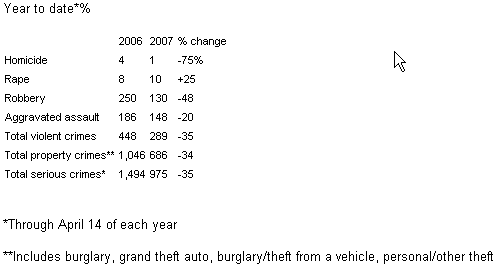

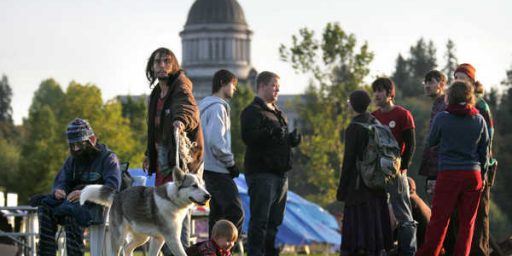
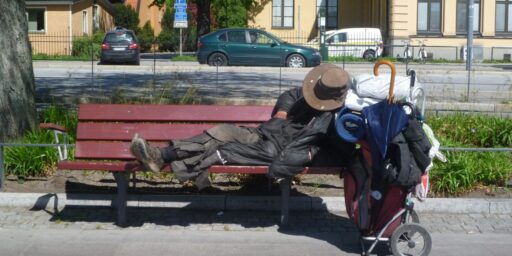
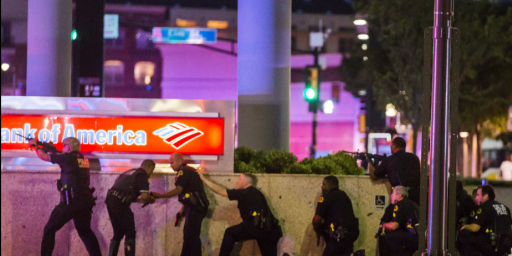

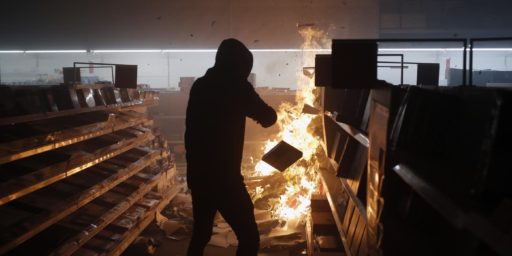
It would be nice if there were some real repercussions to the abhorrent dumping of the poor and mentally ill on LA’s skid row from area hospitals.
James, I’ve got to disagree with a couple points you make.
“Could . . . as a condition.” If the release is NOT, however, conditioned on such searches, they are clearly violative of the citizen’s fourth amendment rights. If only some parolees or probationers are on such a conditional release, yet the police engage in a wide-ranging scope of searching all parolees and probationers is, as a policy, clearly violative of the fourth amendment rights of parolees and probationers. This isn’t limited to the fourth amendment, because without notice that such a release is conditional, there are due process implications as well.
So what, exactly, are those “specific uses”? Anything that a landowner wishes them to be? The ordinance in question criminalized behavior that is effectively engaged in only by those who have no choice, meaning that it was selectively enforced against a class of people that would not have been otherwise targetable. It seems that the real issue might have been that this ordinance putatively allowed the detention and search of homeless individuals without any other evidence that they had engaged in illegal behavior. Courts have time and time again ruled that such ordinances, drafted in a “facially neutral” way but in reality designed to target a certain class of individual through overinclusiveness coupled with selective enforcement, are unconstitutional circumventions of more obvious constitutional bans.
The fact is, if the police do their jobs, they can easily come up with many reasons to search particular individuals without having to resort to blanket means that impugn the rehabilitated or the innocent. We talk about the slippery slope a lot on this site with regard to government power; this ruling is exactly the kind of check that unfettered executive power requires to keep it from swallowing the rights of the citizenry as a whole.
This could be true–of course it is important to remember that the homeless are more often the VICTIMS of violent crime than they are perpetrators.
Brekke, et. al. published a study in the journal Psychicatric Services [52:1358-1366, October 2001] that found–in Los Angeles–that homeless were 14 times more likely to be victimized by violent crime than to commit violent crime.
I have wonderful memories of my Grandfather, who arrived a young man from Mayo in the West of Ireland, and settled in Boston in the late 1930s.
He never passed a person less fortunate than himself without first attempting some form of help, and he held firm to the basic idea of ‘there but for the grace of God go I’.
While he lived through hard times, our own perhaps are harder still, dominated as they are by the barely suppressed disgust voiced by our republican leaders and their supporters for those whose lives they consider of less value then their own.
A post like James’s would have broken his heart.
Now that is interesting. Could it be that the dramatic drop in crime in that area is caused more by the removal of potential victims than by the removal of potential perpetrators?
That is what I was thinking. There were some issues with the Brekke study’s methodology to make the 14x figure generalizable. However, the literature on homlessness is pretty clear that homeless are more susceptible to violent crime than the general population.
If so, isn’t that a good thing?
You’ve got people living on the streets unable to support or protect themselves. Some percentage, undoubtedly, are down-on-their-luck types doing an unpaid internship at Merrell Lynch. A somewhat greater number, I’d wager, are mentally ill and/or drug addicts.
Depends on how you are removing the potential victims. If we made it illegal for women to be in LA, I’m sure rape statistics there would be way down. But isn’t the whole idea of justice to punish the offenders, not the victims?
In this case, I don’t think they’re giving the homeless a home, an education or a job, just telling them they have to go sleep on someone else’s sidewalk, and be a part of someone else’s violent crime statistics.
I certainly agree with all the pro homeless positions. I think it is entirely defensible that all public areas should be available for all homeless uses. Besides who really cares if the other 99% of the population can not use them because of the aggressive panhandling or the smell of urine.
So outlaw panhandling and public urination. Or should we start forcing out any group who’s stereotype depicts them as prone to misdemeanors? After all, who cares if we violate the constitutional rights of only 1% of the population, as long as it makes the other 99% feel more comfortable.
Actually they were dumping the homeless back on skid row, but what else do you do with them? Keep them in the hospital where they take up valuable and expensive bed-space? Force them into a shelter, which in some cases leads to violent outbursts? There is no where else they can release them to in many of the dumping cases, unless of course you want the hospital to buy them a house to release them to.